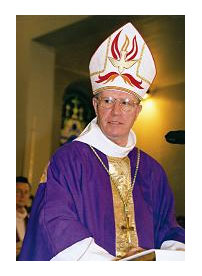«Labour Day» Message from the Roman Catholic Church
Dear brothers and sisters in Christ and in our common humanity, dear friends.
All over the world, the 1st of May is celebrated as “Labour Day”. Today, from North to South and East to West of the globe, there are celebrations for the work done in each and every country. However, depending on the socio-political and economic situation of each nation the actual way in which the celebration on Labour Day takes place varies considerably.
May is celebrated as “Labour Day”. Today, from North to South and East to West of the globe, there are celebrations for the work done in each and every country. However, depending on the socio-political and economic situation of each nation the actual way in which the celebration on Labour Day takes place varies considerably.
In some countries the 1st of May is the occasion for the different political parties to flex their muscle by having large rallies. In others, it is more a ‘workers’ day, where workers from all walks of life gather to show their solidarity and the strength of their unions. In all countries in one way or another this day is set aside to ponder on the value of WORK, the human dignity it gives us, and as a reminder of its necessity for our nation’s economy. It is a day set aside to celebrate the work we do and to show our determination that we wish to improve the quality of our work and the working conditions of all workers.
This year in the Seychelles, the representatives of the three social partners, namely: the employers, the workers and the Government, have come together at the beginning of the various activities that will take place around Labour Day, to put before our Creator and Lord, the work that we accomplish to sustain our lives and that of our family, the work that we have done to increase the wealth and economy of our country.
It is interesting to note that in the Creation story of the Bible, in the first chapters of the book of Genesis, the Lord God created man and placed him in the Garden: “Yahweh God took the man and settled him in the garden of Eden to cultivate and take care of it”(Genesis 2.15). ‘To cultivate and take care of the garden’: yes! WORK is part of creation, it is part and parcel of our human condition. Perhaps, because of the fall, that is the sin at the beginning of mankind and the profound wounds caused by the sin of men in all generations after the fall, we have been used to consider work more as a constraint, rather than as something which comes naturally to sustain our life and beautify the world we live in. This is true especially of those of us in society who are involved in heavy, manual work, demanding long hours of repetitive actions often in an environment detrimental to good health. Today we celebrate the work that we all do but especially the work of those women and men in our society who are involved in such situations of hardship in their working place. The celebrations on Labour Day point towards a just reward especially for this category of workers and a fair assessment whether their conditions should not be improved.
It is a healthy sign when a society is able to celebrate the accomplishments of the past and the good that is being done. Today we wish to place before our Lord and God the result of our work and thank him for the gift of being able to participate in the work of creation. However, celebration is not enough. And the Lord himself urges us forward. Lest we become complacent, He generates in us the desire to perform our work with greater creativity and efficiency, to improve the industrial relations in our society, to be more attentive to those who do not work, to make the best use of the talents of all those who are gifted in our society, by a selection for jobs based first and foremost on merit. He invites us to be even more efficient in our work at whatever level of the social scale we are at – for we have achieved a lot yet we can go much further.
Considering the impact of the Labour movement in the world and in particular in many countries with which Seychelles has ties, I think it is right, on this day of reflection, to consider how a more in-depth and sincere debate can be initiated and pursued between the three social partners: the Government, the workers and the employers. We lack such a forum at the moment and many, who have the good of our country at heart, are calling for it so that our country can progress. In a similar way, there is an urgent call to support more actively all those who are committed to the promotion of human rights and to establishing the labour movement on a more firm basis.
The Church celebrates
Bishop Denis Wiehe, Diocese of Port-Victoria